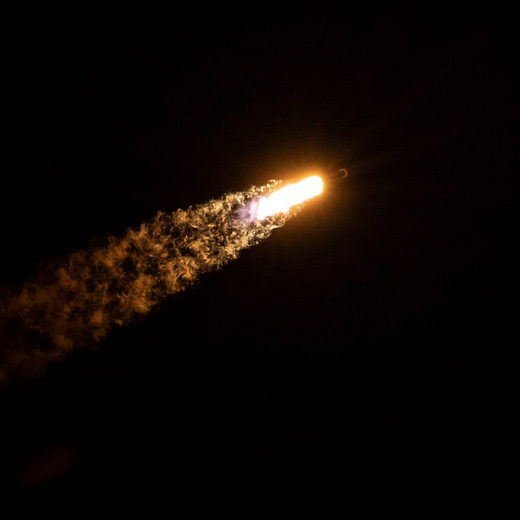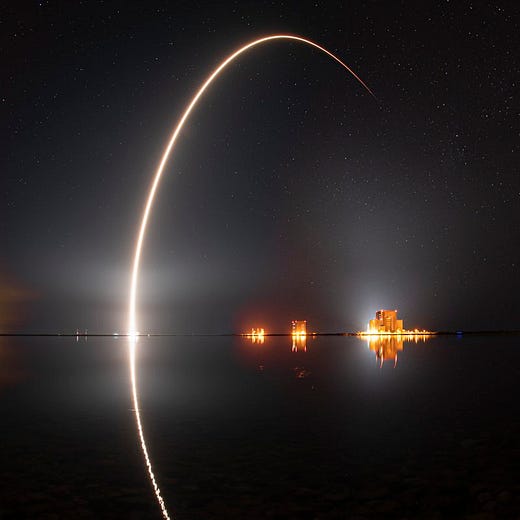📸 SpaceX photo shows record-setting Falcon 9
Musk Reads #238
Tesla Semi steps forward, SpaceX sets a rocket record, and Starship set for fixes. It’s the free edition of Musk Reads #238 — subscribe now to receive two more editions later this week!
Last week, Musk Reads+ subscribers heard from Rocket Lab CEO Peter Beck with a deep dive into the Neutron rocket, its human spaceflight capabilities, and what it all means for Beck’s goals to visit Venus. This week, subscribers will hear from MaryLiz Bender, who simulated a trip to Mars in Hawaii’s HI-SEAS habitat, about the one feature Musk needs for his Mars city.
Also, stay tuned for an exciting anniversary edition, coming exclusively to Musk Reads+ subscribers...
Don’t miss out — new members receive instant access to our ever-expanding archive, future premium issues, and much more. Subscribe to Musk Reads+.
Musk quote of the week
“SpaceX did 2X rest of world payload to orbit last year, probably 3X to 4X this year.”
Read more about Musk’s goals for 2021.
SpaceX
Liftoff! SpaceX successfully launched a batch of 60 Starlink satellites on March 14 at 6:01 a.m. Eastern time. The Falcon 9 booster took off from Launch Complex 39A at the Kennedy Space Center in Florida. The satellites will be used to support SpaceX’s internet service, currently in the beta phase, that will offer high speed and low latency connectivity from practically anywhere with a view of the sky.
This was the ninth successful launch and landing for this particular Falcon 9, setting a new record for rocket reusability. SpaceX aims to reuse its boosters as much as possible to reduce the costs of spaceflight. The booster previously supported the Crew Dragon’s Demo-1 mission in March 2019, the RADARSAT constellation launch in June 2019, the SXM-7 launch in December 2020, and five Starlink missions.
Following the launch, SpaceX shared two impressive images of the booster taking off:
Tesla
Musk has a new job title. On Monday, a filing with the Securities and Exchange Commission showed the CEO will now also be known as “Technoking of Tesla.” He is joined by Zach Kirkhorn, the chief financial officer, who is now also known as Master of Coin.
Another commission filing suggests the Tesla Semi project, the firm’s planned all-electric semi truck, is stepping up a gear. Jerome Guillen, Tesla’s president of automotive, is now president of Tesla Heavy Trucking. The filing states that Guillen will lead “all aspects of the Tesla Semi program, including the related charging and servicing networks.”
Tesla unveiled the Semi in November 2017. Musk called for the truck to enter mass production in June 2020, but in the firm’s January 2021 earnings call, he explained the company doesn’t have enough battery cells right now to produce the truck.
We’ve been overwhelmed by your support and kind words for our work.
“I love each and every Musk Reads+. I am 70 years old and have always had a huge thirst for learning. Your articles have been terrific at peaking my interest for knowledge. I spent 20+ years as a Navigator in the USAF, traveling the world and learning to lead people and doing my best to make them better. I have had many more successes than failures and I greatly appreciate the knowledge I receive from Musk Reads+.” — mkhaley, Musk Reads reader.
To receive two additional emails per week featuring exclusive interviews and analysis, upgrade to Musk Reads+ today.
In other Musk news…
Tesla’s full self-driving is set to improve. On March 12, Musk posted on Twitter that the system in development has expanded to 2,000 owners. The company has also revoked access for drivers who did not pay enough attention to the road. The company’s next release is expected to arrive in April, a release that will drop the use of radar sensors and focus more on using the car’s cameras to control the vehicle.
Starlink is expected to support trucks, ships, and planes, according to a new FCC filing. The service would enable large vehicles like these to get online.
SpaceX started stacking the BN1 prototype of its Super Heavy booster, designed to pair with the Starship to help the Mars-bound rocket leave the Earth.
SpaceX plans “multiple fixes” for the Starship SN11 prototype, Musk explained on Twitter. Its predecessor, SN10, failed to survive a high-altitude launch earlier this month. Musk explained that SN10’s engine was low on thrust “probably” due to “partial helium ingestion from fuel header tank.”
Happy belated Pi Day!
The ultra-fine print
This has been Musk Reads #238, the weekly rundown of essential reading about futurist and entrepreneur Elon Musk. I’m Mike Brown, an innovation journalist for Inverse.
Why subscribe to Musk Reads+? You’ll be supporting in-depth, high-quality journalism about the world’s most ambitious change-maker, Elon Musk.
Tesla investors, SpaceX critics, and anyone with an interest will find something they love in our offerings. Independent journalism is important now more than ever, and your contributions will help us continue in our mission to deliver interviews and analysis you won’t find anywhere else.
Email me directly at mike.brown@inverse.com and follow me on Twitter @mikearildbrown.
Follow Inverse on Twitter @inversedotcom.
Got any comments or queries? Don’t forget to send them over to muskreads@inverse.com.
Musk Reads+ is a fully independent operation. We are not Elon Musk, nor are we employed by him. Our job is to report the events we find newsworthy, giving you the inside look at the worlds of space rockets, electric cars, clean energy, and more. It means firsthand accounts of a SpaceX rocket launch, Tesla insights from third-party analysts, and more.
If you want to support us in our mission, and receive exclusive interviews and analysis, consider contributing with a subscription.




